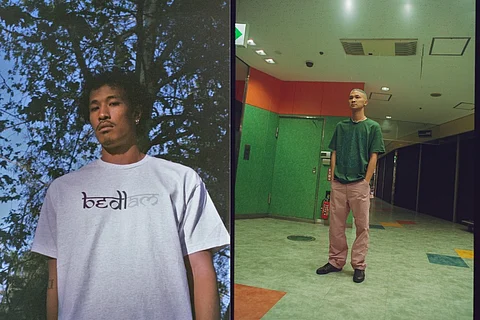
- HOMEGROWN WORLD
- #HGCREATORS
- #HGEXPLORE
- #HGVOICES
- #HGSHOP
- CAREERS
- ABOUT US
- CONTACT US

Diasporic identity can feel very complicated. We tend to fall into the trope of existing between two worlds, not quite embodying just one culture or the other. Too many people consider this multiplicity a pitfall of being part of the diaspora, but, as the Tokyo-based label Bedlam shows us, it’s a strength.
Founded by Nihar Jhaveri in 2018, Bedlam is a clothing brand incorporating Indian imagery into Japanese fashion. Jhaveri grew up in Japan but spent his summers travelling to India, his home country. As a result, his identity was stitched together with elements of both Japanese and Indian culture. Jhaveri channelled his unique identity into Bedlam. He told Homegrown he “created Bedlam to be a bridge between India and Japan,” embracing his multicultural upbringing through apparel.
“I created Bedlam to be a bridge between India in Japan because although I grew up in Tokyo, I'm forever connected with my roots in India.”
Nihar Jhaveri for Homegrown
The beauty of growing up around multiple cultural influences is that it differentiates your outlook. When talking about his diasporic experience, Jhaveri expressed, “I’ve always lived between identities. Never fully one or the other.” However, he also considered the positive values he has taken from each culture, stating his “Indian roots taught [him] the importance of culture and community” while Japan taught him how to “appreciate details, structure and craftsmanship.”
Though most would consider India and Japan vastly different, Bedlam stands at the intersection of the two cultures. The brand takes from Indian aesthetics, using a Sanskrit-inspired font in the Bedlam logo that finds itself embossed across much of its apparel. However, Bedlam’s ethos, particularly regarding its attention to detail, feels distinctly Japanese. What’s most interesting, however, is the uniquely diasporic side of Bedlam– a side that emerges outside of definitive Indian or Japanese influences. Jhaveri expressed a desire for Bedlam to act as an inclusive space, particularly because existing between cultures can feel isolating. Bedlam doesn’t just serve a Japanese, Indian, or even diasporic audience; it’s all-encompassing, for anyone and everyone.
“Being a part of the diaspora, I’ve always lived between identities. Never fully one or the other. This pushed me to create Bedlam. Not only for myself but for others who feel the same.”
Nihar Jhaveri for Homegrown
If you enjoyed reading this, here’s more from Homegrown:
A London Exhibit Will See 26 South Asians Spotlight The Complexities Of Their Homelands
Artisanns Nest Is Consciously Stitching A Bold New Future For Indian Fabric Waste
Homegrown Label Ugra's Handcrafted Leather Heels Celebrate Fearless Femininity
